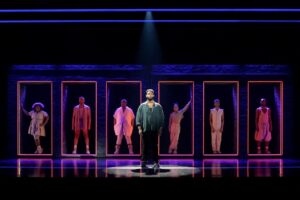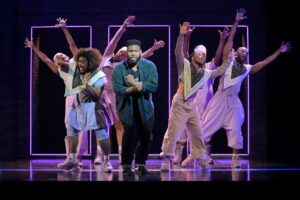A Strange Loop
Michael R. Jackson (Book, Music & Lyrics)
American Conservatory Theater, in Co-Production with Central Theatre Group

Two minutes until the intermission of The Lion King ends. The usher – who just happens to be named Usher – dings the ‘bing-bong-bing’ warning to scurry folks back to their seats. Recurring thoughts begin swarming in his head – often “extremely obnoxious thoughts” like “your daily self-loathing” and “your sexual ambivalence” – as he contemplates how to conjure up “a big, Black, queer-ass, Broadway show.” After all, Usher is a “Black queer man writing a musical about a Black queer man writing a musical about a Black queer man.” Wanting desperately to depict in his musical what it is like to “travel the world in a fat, Black, queer body,” Usher also knows that it is a mostly white audience that will eventually come to the musical he writes – a audience that lives in “a white world that chews up and spits out black queers on the daily.”

In a musical, visual, and emotional explosion of Black and queer power, American Conservatory Theater opens in a West Coast premiere Michael R. Jackson’s 2020 Pulitzer Prize for Drama and 2022 Tony winner for Best Musical, A Strange Loop. Aspiring musical theatre writer Usher exposes in the wildest, rawest fashion his inner thoughts and swirling memories in loops upon loops of self-inquiries, -doubts, -reprimands, and -discoveries. He eventually arrives back where he starts at a theatre’s and life’s intermission with a new understanding of what he needs to do to move ahead in his work and his life – all a part of “a strange loop.”

Even with music and lyrics that span an eclectic but recognizable range of folk, rock, gospel, disco, and alternative (and of course, big-stage Broadway), A Strange Loop is in many ways a musical like none other Broadway has seen. The pace of the one-hour, forty-minutes (no intermission) is non-stop, often near-frenetic but never out of control. Usher’s Thoughts appear in six Broadway-lit door frames, but like all thoughts, they are rarely stable. Guided by the wickedly wonderful and incredibly insightful direction of Stephen Brackett as well as by the constantly shifting and surprising bombshell choreography by Raja Feather Kelly, these Thoughts are always on the move, often surrounding, circling, pressing, and pressuring Usher with their suggestions, accusations, mimics, and “facts” as they see them. His Thoughts also mold themselves quickly into different persona from his memories – “my discontentment that comes in many different shapes and sizes” – from a Mama worried he’s on his way to hell to a homophobic Dad berating him while clutching his bottle of gin to his regular, white, Gindr hookup who is clearly a racist.

Malachi McCaskill is a powerhouse wonder as Usher. Immediately likable and relatable, his Usher sings with a voice that sounds natural, familiar, and inviting in notes quite conversational. Yet when emotions rise boiling over within him, his tenor rises to the occasion with electrifying energy and take-charge, take-notice timbre. His memories roll through the pressures others place on his current writer’s block like the mother and agent who just want him to write a gospel play about Bible- and Jesus-loving, Black folks. When he imagines giving in to write such a play, the mock-scene of his spitting out the script in bullet-speed, taking on characters with caricature flair and frenzy is just one of a number of show-stopping scenes where director, Usher, and his Thoughts combine their genius to leave us as an audience jaw-dropped and open-eyed in amazement.
The lead-in to his agreeing hypothetically to writing the gospel play is a hilarious and raucous sequence of Thoughts entering his imagination in the likes of “Harriet, Mother-Fucking Tubman,” “Jimmy Baldwin,” “Twelve Years a Slave” (carrying an Oscar of course), and a fabulous, in full sparkles Whitney Houston. With big, brassy beats, sounds, and steps, the Thoughts accuse Usher of being a “race traitor” because he refuses to give the people (including his mama and agent) the “real life stories we can swallow, like Popeyes chicken and biscuits.”

And if anyone – especially any audience member from San Francisco – ever thought that the last thing they would ever do is sit through a church-like service of full-blown, hand-clapping, arm-swaying gospel music declaring “AIDS is God’s punishment,” then think again. The entire ACT auditorium awash in the color of sinful red and stroked with roaming spotlights becomes a scene surreal as Usher’s Thoughts take him and us to a time when the message was it is better to die from AIDS that live with it, much less survive – just one more of Usher’s stops on his journey to discover what, if anything, he can do to change who he is.
The many dozens of faces, personalities, voices, and images that the Thoughts portray – all enhanced by Montana Levi Blanco’s array of eye-popping costumes and Cookie Jordan’s designs of hair, wigs, and make-up – are mind-boggling in their quantity but even more so in their exceptional, overall and individual quality. Particularly impressive is when the ensemble of six becomes the interwoven voice of one person, like Usher’s mother as in one scene where all dressed in her white robes and fluffy house slippers sing/speak in interloping phrases Mama’s advice to Usher (“We Wanna Know”). Tarra Conner Jones, J. Cameron Barnett, Avionce Hoyles, John-Andrew Morrison, Jordan Barbour, and Carlis Shane Clark are all stars of the show as Thoughts 1-6, respectively. While it is somewhat tricky to single out any singular performances among them, John-Andrew Morrison’s bring-‘em-to-their-feet moments as Mama singing in “Periodically” her full-of-love, “It’s ain’t right with God,” birthday greeting to her queer son will long be in this reviewer’s memory as a knock-it-out-of-the-ballpark homerun.
Further applause goes to the combined creativity of scenic and lighting designers, Arnulfo Maldonado and Jen Schriever who together continue to surprise with their ever-changing revelations of scenic elements lit with colors that shift as moods and memories furiously swing in Usher’s mind. Music Director and keyboardist Sean Kana ably leads the five-person band in the many genre-shifts of music Stephen Brackett has crafted.
The incredible, magnetic strength of Jackson’s book, lyrics, and music forces us as audience eventually to see that Usher as a big, Black, queer man is not that unlike the majority of us in his audience. We soon come to see that Usher is all of us no matter our size, race or gender/sexual preference. How many times as his Thoughts rush in and out of his head do we have past thoughts, criticisms, and questions pop up once again in our heads, each somehow stimulated by a question, a doubt, or an insight Usher is on stage having? Usher is the essence of Every Human who has thoughts and memories that daily make us re-examine and question who and why we are who we are before helping us finally to accept ourselves as we are. Usher reminds us all to be wary of those nagging Thoughts that arouse themselves in the middle of the night – “thoughts that are just an illusion.” After all, they are just part of “a strange loop.”
Rating: 5 E
A Theatre Eddys Best Bet Production
A Strange Loop continues through May 12, 2024, in a one-hour, forty minute (no intermission) co-production by the American Conservatory Theater with Central Theatre Group in the Toni Rembe Theater, 415 Geary Street. Tickets are available online at http://act-sf.org , by box office phone at 415-749-2228, or by email at https://www.act-sf.org/ .
Note As Warned by ACT website: [This production] “contains explicit language, references to internalized racism, homophobia, sexual assault, and scenes of an adult nature.”
Photo Credits: Alessandro Mello
